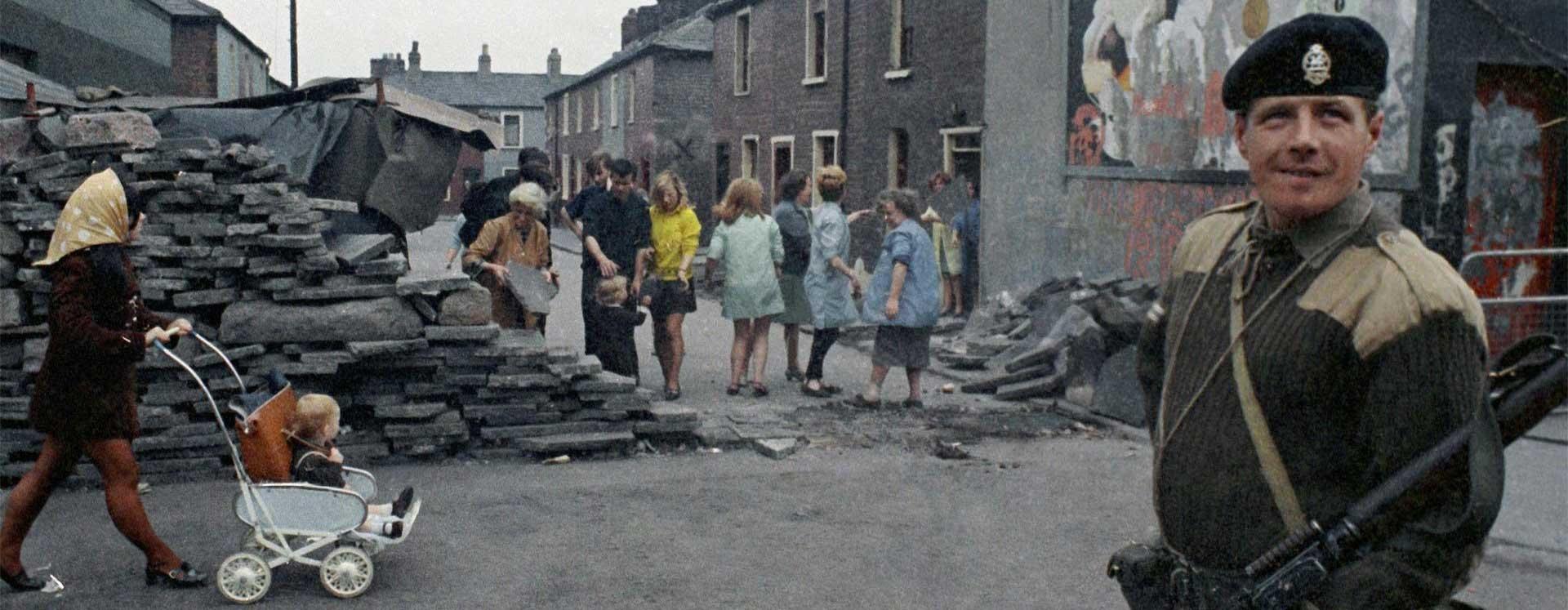Streaming on the PBS App three months before its broadcast premiere August 28-30, Once Upon a Time in Northern Ireland is a powerful, new, five-part series that gives voice to the people who lived through Northern Ireland’s violent past. You will hear intimate, unheard testimonies from all sides of the conflict. The series combines unfiltered personal accounts with archival footage to tell the story of the people and communities that had to live with conflict daily—and are still dealing with its legacy today.
Once Upon a Time in Northern Ireland is an extraordinarily intimate and affecting portrait of how events and actions of the past are measured in individual lives and collective memories. At the heart of every conflict are the people involved, and we are grateful to the courageous men and women who shared their personal stories with us,” says Bill Gardner, vice president of multiplatform programming and head of development for PBS.
The series, from award-winning director James Bluemel and the BBC, runs chronologically from the beginning of The Troubles in the late 1960s to the Belfast/Good Friday Agreement in April 1998.
All five hours of Once Upon a Time in Northern Ireland will be available to stream through November 22 on ninepbs.org and the PBS App, available on iOS, Android, Roku, Apple TV, Amazon Fire TV, Android TV, Samsung Smart TV, Chromecast, and VIZIO.
The broadcast schedule is subject to change.
Episode 1: It Wasn’t Like a Movie Anymore
Monday, August 28, 8 pm
The opening episode charts Northern Ireland’s progression from relative peace to full-blown conflict. When tensions between Catholic and Protestant communities explode, the British Army is deployed. When 13 unarmed Catholics are shot dead in Derry by British Paratroopers, the world looks on in shock. Known as “Bloody Sunday,” it has far-reaching political consequences and is seen by some as a recruitment drive for the Provisional IRA.
Episode 2: Do Paramilitaries Lie Awake at Night?
Monday, August 28, 9 pm
It is now 1972, and a deeply segregated society has emerged, with many Catholic and Protestant working-class communities policed by paramilitary organizations. Hatred and fear of the "other side" are endemic, as is a devotion to one’s own culture and traditions. Six months after Bloody Sunday, the IRA explode 19 bombs across Belfast in an hour, killing 9 and injuring 130 others. But punk music emerges as a unifying force for some young Catholics and Protestants, who defy the chaos and segregated world around them.
Episode 3: So Many Broken Heart
Tuesday, August 29, 8 pm
The devastating impact of the conflict is explored through the stories of three women, as IRA prisoners begin hunger strikes to protest Margaret Thatcher’s policies. Tit for tat killings, car bombs, and assassinations are now part of everyday life in Northern Ireland. Fatigue, from a population desperate for a respite from the violence, is creeping in.
Episode 4: The Dirty War
Tuesday, August 29, 9 pm
By the late 1980s, the news in Northern Ireland is a daily list of the dead, but 14 bloody days in March 1988 mark a new level of harrowing savagery. The conflict also becomes an intelligence war, as the move to prevent further terrorist violence is concentrated on infiltrating paramilitary organizations. “Trust nobody” is the mantra as fear and suspicion permeate all parts of everyday life.
Episode 5: Who Wants to Live Like That?
Wednesday, August 30, 9 pm
In 1994, President Bill Clinton controversially invites Gerry Adams, President of Sinn Fein (often referred to then as the "IRA's political wing"), to the U.S. For some, it’s a symbol of international support for peace talks. But others, whose families have been devastated by the violence, are horrified. Even as tensions run high, following years of negotiations between politicians, paramilitaries, and the British and Irish governments, an IRA ceasefire is announced in 1994. A loyalist paramilitary ceasefire followed six weeks later.
There is widespread joy when the Good Friday Agreement is finally announced in 1998. But peace comes at a cost. The early release of all paramilitary prisoners from prison—a key part of the agreement—causes anguish for many, especially the injured and bereaved, who face what all post-conflict societies face, a peace built upon the violence of the past.




